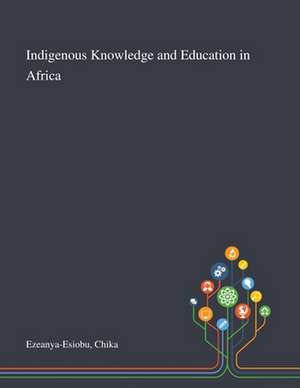Indigenous Knowledge and Education in Africa
Autor Chika Ezeanya-Esiobuen Limba Engleză Paperback – 7 oct 2020
| Toate formatele și edițiile | Preț | Express |
|---|---|---|
| Paperback (1) | 248.34 lei 6-8 săpt. | |
| Saint Philip Street Press – 7 oct 2020 | 248.34 lei 6-8 săpt. | |
| Hardback (2) | 336.19 lei 6-8 săpt. | |
| Springer Nature Singapore – 10 mai 2019 | 418.83 lei 3-5 săpt. | |
| Saint Philip Street Press – 7 oct 2020 | 336.19 lei 6-8 săpt. |
Preț: 248.34 lei
Nou
Puncte Express: 373
Preț estimativ în valută:
47.52€ • 49.84$ • 39.56£
47.52€ • 49.84$ • 39.56£
Carte tipărită la comandă
Livrare economică 01-15 aprilie
Preluare comenzi: 021 569.72.76
Specificații
ISBN-13: 9781013270581
ISBN-10: 1013270584
Pagini: 118
Dimensiuni: 216 x 280 x 6 mm
Greutate: 0.3 kg
Editura: Saint Philip Street Press
ISBN-10: 1013270584
Pagini: 118
Dimensiuni: 216 x 280 x 6 mm
Greutate: 0.3 kg
Editura: Saint Philip Street Press
Cuprins
1. Indigenous Knowledge And Its Importance In Africa’s Curriculum.- 2. Foundations For An Indigenous Knowledge Based Curricula.- 3. Historical Foundations Of Formal Education Curriculum In Africa.- 4. Contemporary Education Curriculum In Africa.- 5. Africa’s Indigenous Knowledge: From Education To Practice.- 6. The Case Of Traditional Bonesetting And Orthopaedic Medical Curriculum.- 7. Research, Innovation, Indigenous Knowledge and Policy Action in Africa.- 8. Conclusion: Towards a Mainstreaming of Indigenous Knowledge in Africa’s Curriculum.
Notă biografică
Chika Ezeanya-Esiobu is a researcher, teacher, non-fiction and fiction writer, and a well-known intellectual who holds a Ph.D. in African Development and Policy Studies from Howard University in Washington D.C. At the core of Chika’s research interests is the multidisciplinary exploration of indigenous knowledge, and homegrown and grassroots-based approaches to the sustainable advancement of Africa. In this context, Chika’s interests extend further to education, specifically curricula as central to indigenous knowledge research development. Chika has published numerous academic articles in peer-reviewed journals, book chapters and short essays, and has also produced documentary films.
Chika has conducted research on indigenous knowledge and homegrown approaches to sub-Saharan Africa’s growth for such organizations as the United Nations University World Institute for Development Economics Research (UNU-WIDER), United Nations Research Institute for Social Development (UNRISD), the Swedish International Development Agency (Sida), International Development Research Center (IDRC) Canada and the African Economic Research Consortium.
Textul de pe ultima copertă
This open access book presents a strong philosophical, theoretical and practical argument for the mainstreaming of indigenous knowledge in curricula development, and in teaching and learning across the African continent. Since the dawn of political independence in Africa, there has been an ongoing search for the kind of education that will create a class of principled and innovative citizens who are sensitive to and committed to the needs of the continent. When indigenous or environment-generated knowledge forms the basis of learning in classrooms, learners are able to immediately connect their education with their lived reality. The result is much introspection, creativity and innovation across fields, sectors and disciplines, leading to societal transformation. Drawing on several theoretical assertions, examples from a wide range of disciplines, and experiences gathered from different continents at different points in history, the book establishes that for education to trigger thenecessary transformation in Africa, it should be constructed on a strong foundation of learners’ indigenous knowledge.
The book presents a distinct and uncharted pathway for Africa to advance sustainably through home-grown and grassroots based ideas, leading to advances in science and technology, growth of indigenous African business and the transformation of Africans into conscious and active participants in the continent’s progress. Indigenous Knowledge and Education in Africa is of interest to educators, entrepreneurs, policymakers, researchers and individuals engaged in finding sustainable and strategic solutions to regional and global advancement.
Chika Ezeanya-Esiobu is a researcher, teacher, non-fiction and fiction writer, and a well-known intellectual who holds a Ph.D. in African Development and Policy Studies from Howard University in Washington D.C. Chika has published numerous academic articles in peer-reviewed journals, book chapters and short essays, and has also produced documentary films.
Chika has conducted research on indigenous knowledge and homegrown approaches to sub-Saharan Africa’s growth for such organizations as the United Nations University World Institute for Development Economics Research (UNU-WIDER), United Nations Research Institute for Social Development (UNRISD), the Swedish International Development Agency (Sida), International Development Research Center (IDRC) Canada and the African Economic Research Consortium.
The book presents a distinct and uncharted pathway for Africa to advance sustainably through home-grown and grassroots based ideas, leading to advances in science and technology, growth of indigenous African business and the transformation of Africans into conscious and active participants in the continent’s progress. Indigenous Knowledge and Education in Africa is of interest to educators, entrepreneurs, policymakers, researchers and individuals engaged in finding sustainable and strategic solutions to regional and global advancement.
Chika Ezeanya-Esiobu is a researcher, teacher, non-fiction and fiction writer, and a well-known intellectual who holds a Ph.D. in African Development and Policy Studies from Howard University in Washington D.C. Chika has published numerous academic articles in peer-reviewed journals, book chapters and short essays, and has also produced documentary films.
Chika has conducted research on indigenous knowledge and homegrown approaches to sub-Saharan Africa’s growth for such organizations as the United Nations University World Institute for Development Economics Research (UNU-WIDER), United Nations Research Institute for Social Development (UNRISD), the Swedish International Development Agency (Sida), International Development Research Center (IDRC) Canada and the African Economic Research Consortium.
Caracteristici
Provides a pathway for transforming Africa’s education curriculum Demonstrates how Africa can leverage indigenous knowledge to spark much needed creativity and innovation across the continent Offers a much-needed roadmap for growth via education in Africa in a way that is appealing to academics and practitioners alike
